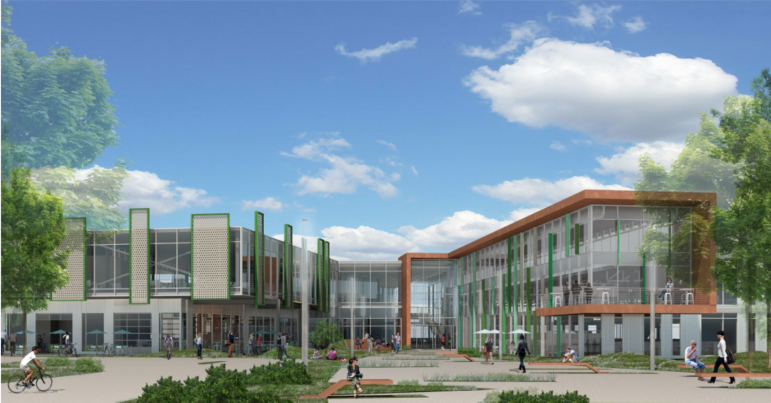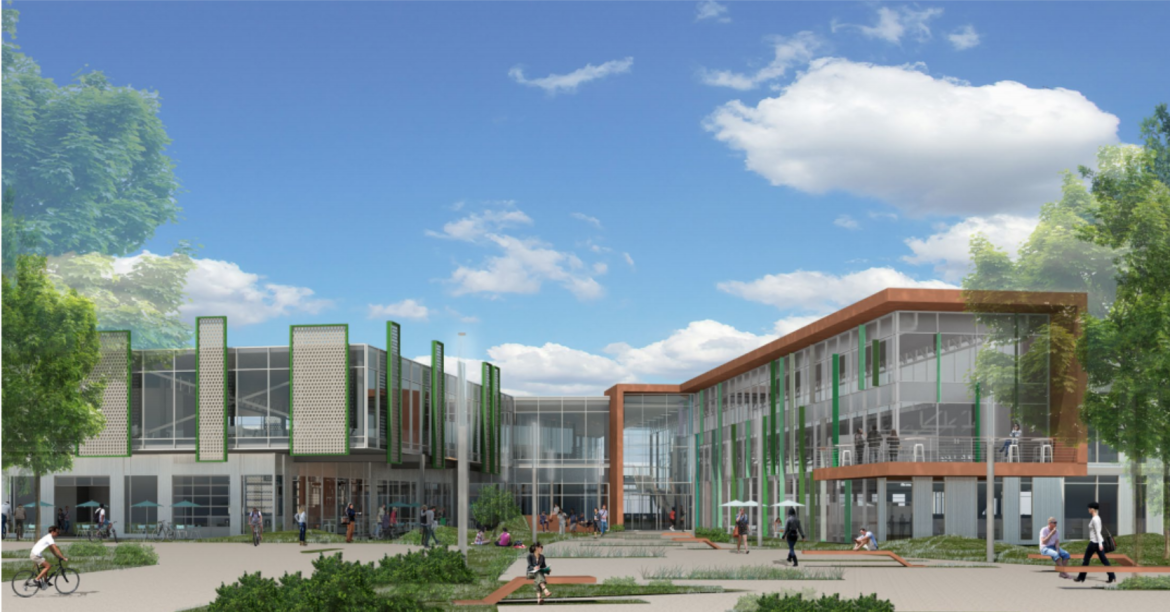
Boylston Properties
The Linx building at 490 Arsenal Way is home to biotech firms, and more may be coming to other parts of Watertown.
Following a wave of input from concerned residents, Watertown officials will look at ways to make sure that biotech labs in town are safe.
The issue arose in August when the developers of Arsenal Yards proposed changing office space in the renovated Arsenal Mall into space for biotech research and development. The issue is not likely an isolated one, with biotech being one of the fastest growing industries in the United States and in Massachusetts, and other communities in the area are taking steps to attract this sort of company.
Residents noted that other towns have regulations for laboratories and some have committees to oversee biotech companies and advise the Board of Health.
At Tuesday’s Town Council meeting, Council President Mark Siders said steps will be taken in Watertown to increase oversight of biotech facilities.
“Watertown falls a little short when regulating these types of laboratories,” Sideris said.
A memo from Assistant Town Manager Steve Magoon to the Town Council said that the Watertown Board of Health will develop a framework for overseeing biotech companies.
“Many of the surrounding jurisdictions have a greater level of local oversight of these uses than we have here in Watertown,” Magoon’s memo reads. “These have typically taken the form of a Committee that has expertise and can provide review based on industry knowledge.”
The memo also noted that labs are currently allowed in several zoning districts in Watertown, including the industrial zones, the Regional Mixed Use District (RMUD), and the Pleasant Street Corridor District by special permit with site plan review.
Arsenal Yards Developers Seek Biotech Tenants, Planning Board Wants More Details
Growing Industry
Biotech is one of the fastest growing industries in the U.S., and Massachusetts area is one of the hubs with 550 companies (many in the Boston/Cambridge area), according to an article from the Hult International Business School.
Sideris said bringing in more biotech can help other local businesses, citing the impact of the recently completed Linx building (the former Verizon facility) off Arsenal Street and near Coolidge Square.
“I spoke to the owner of a business near the Linx who said he has seen more business since Linx opened and is looking to hire more help,” Sideris said.
Town Councilor Angeline Kounelis said she believes it is important for the community to know where the biotech firms are going in. While she noted they have benefits, such as increasing taxes going to the Town, they also have their own risks and concerns.
She noted that the Linx project was originally billed as an office building, but became biotech lab space, and now the same is being requested at Arsenal Yards on the second floor of the building where Marshall’s is located. She worries that the Town will be impacted by the change of type of use of these buildings, and used the example of a new electrical conduit approved for the Linx project across a recently repaved section of Nichols Avenue.
“The developer’s constantly evolving plans should not be a burden to Watertown as witnessed last evening with the request for 70 feet of conduit in a newly paved roadway; even when the roadway improvements are mitigation monies,” Kounelis said.
Resident Elodia Thomas, who said she supports having more biotech firms but wants more oversight, said that it is not clear how many biotech firms exist in Town. She has seen estimates of 31 by MassBio, and as few as 17 by the State. She has been able to identify 3o.
She also wants to limit what kinds of research is done at the labs. The research is classified by BioSafety Levels, with 1 being the least hazardous and 4 being the highest. She does not want to see BioSafety Levels of 3 or 4 in Watertown (Level 3 includes diseases such as yellow fever, West Nile virus, and the bacteria that causes tuberculosis, Level 4 includes Ebola).
Other states and cities around the country have started incentives to bring biotech firms into their areas. Communities in Massachusetts have done the same, Sideris said. Some have been rated Gold BioReady by the Massachusetts Biotechnology Council (MassBio), meaning they have sites or buildings pre-permitted for biotech labs or manufacturing. Sideris noted that Newton recently took away the requirement for biotech companies to go through the special permit process to be approved.
Watertown falls in the Gold rating by already having biotech lab or manufacturing in town.
Cambridge, Waltham and Lexington have gone a step further and become Platinum BioReady. Reaching this level requires the local Board of Health adopting the National Institute of Health (NIH) guidelines for rDNA activity and has already permitted 20,000 sq. ft. or more of available space for biotech use. Another way to earn Platinum rating is having shovel-ready pre-permitted land with a completed Massachusetts Environmental Policy Act (MEPA) review and municipal water and sewer capacity available to meet demand.
